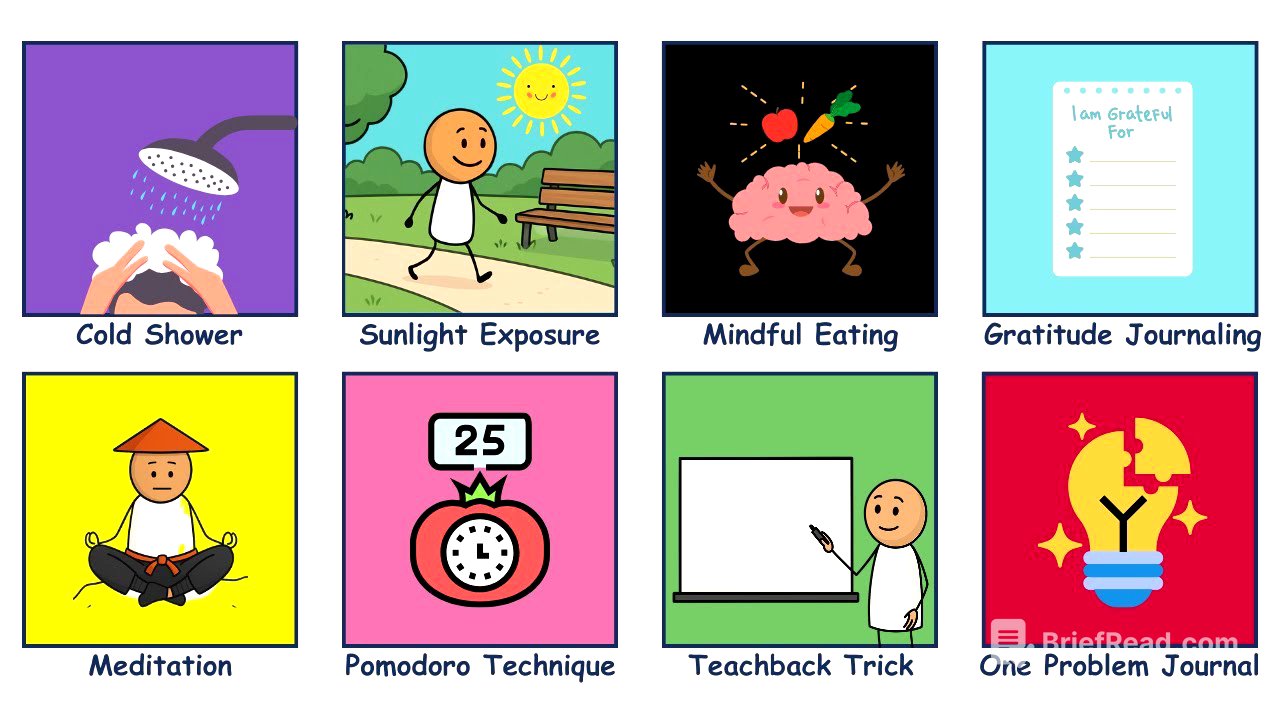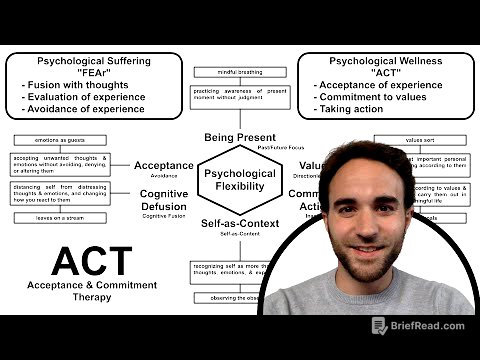TLDR;
This video presents eight daily habits designed to enhance brainpower and mental performance. These habits include taking cold showers, getting morning sunlight, practicing mindful eating, gratitude journaling, meditation, using the Pomodoro Technique, employing the teach-back method, and keeping a "one problem" journal. Each habit is explained with its benefits and practical implementation, offering a comprehensive guide to upgrading cognitive function and overall well-being.
- Cold showers increase dopamine and norepinephrine levels, improving focus and mood.
- Morning sunlight exposure regulates the circadian rhythm, boosting energy and sleep quality.
- Mindful eating improves digestion and provides steady energy to the brain.
- Gratitude journaling increases dopamine and serotonin, reducing stress.
- Meditation enhances memory, learning, and emotional regulation.
- The Pomodoro Technique uses short bursts of focused work to prevent mental fatigue.
- The teach-back method solidifies learning by explaining concepts aloud.
- The "one problem" journal sparks subconscious problem-solving overnight.
Intro: Boost Your Brainpower Daily [0:00]
Many people experience mental fogginess and struggle with focus and creativity. The video introduces eight daily habits to sharpen the brain and enhance cognitive function. These habits are presented as practical steps that can be implemented immediately to achieve significant improvements in brainpower over time.
Cold Shower: The Ultimate Mind Reset [0:26]
Taking a cold shower is a quick way to revitalize the brain. Spending 30 seconds under cold water can increase dopamine levels by up to 250%, boosting motivation. It also triggers the release of norepinephrine, which enhances focus and mood. Overcoming the initial discomfort of the cold water builds mental resilience and sets the tone for making disciplined choices throughout the day.
Morning Sunlight Exposure: Natural Energy Hack [1:06]
Exposing yourself to morning sunlight helps regulate the brain's circadian rhythm. Spending 5-10 minutes in direct sunlight (without sunglasses or window filters) within the first hour of waking signals to the brain that it's daytime, boosting serotonin levels and improving mood. This practice also aids in better sleep later by converting serotonin to melatonin.
Mindful Eating: Fuel Your Brain the Right Way [1:48]
Mindful eating involves slowing down, paying attention to the food, and savoring each bite, which is the opposite of rushing through meals while distracted. Eating mindfully improves digestion, regulates blood sugar, and provides the brain with a steady supply of energy. This practice also strengthens neural circuits related to attention and self-control.
Gratitude Journaling: Rewire Your Mood [2:24]
Gratitude journaling is a simple, two-minute habit that can reshape brain chemistry. Writing down three things you're grateful for each morning increases dopamine and serotonin levels, which are the "happy chemicals," while lowering cortisol, the stress hormone. This practice builds mental resilience and trains the brain to focus on opportunities rather than dangers.
Meditation: Master Your Inner Game [3:02]
Meditation involves sitting still, focusing on your breath, and gently redirecting your mind when it wanders. Regular meditation, even for just 5 minutes a day, builds awareness and control over your thoughts. MRI scans show that meditation can increase gray matter in brain areas linked to memory, learning, and emotional regulation, enhancing stress resistance.
Pomodoro Technique: Laser-Focused Work Sessions [3:44]
The Pomodoro Technique involves working in short bursts of focused activity followed by short breaks. Work for 25 minutes with full focus, then take a 5-minute break to stretch and breathe. This method prevents mental fatigue and trains the brain to enjoy deep focus, outperforming traditional "hustle harder" approaches.
Teachback Trick: Supercharge Your Learning [4:20]
To accelerate learning, teach a new concept or skill immediately after studying it. Explaining the material out loud helps organize scattered information into coherent knowledge. If you struggle to explain something, it indicates gaps in your understanding. This method solidifies memory and strengthens neural pathways.
The One Problem Journal: Solve Smarter, Not Harder [4:54]
Instead of numbing out at the end of the day, use a "one problem" journal to spark subconscious problem-solving. Before bed, write down one challenge you're trying to solve. This plants a seed in your mind, allowing your brain to work on the problem overnight through diffuse thinking, often leading to new ideas and breakthroughs.
Final Thoughts: Your New Brainpower Blueprint [5:30]
The video summarizes the eight daily habits, emphasizing their cumulative effect on upgrading brain function and overall well-being. By consistently implementing these practices, individuals can enhance their mental capabilities and improve their future prospects.









